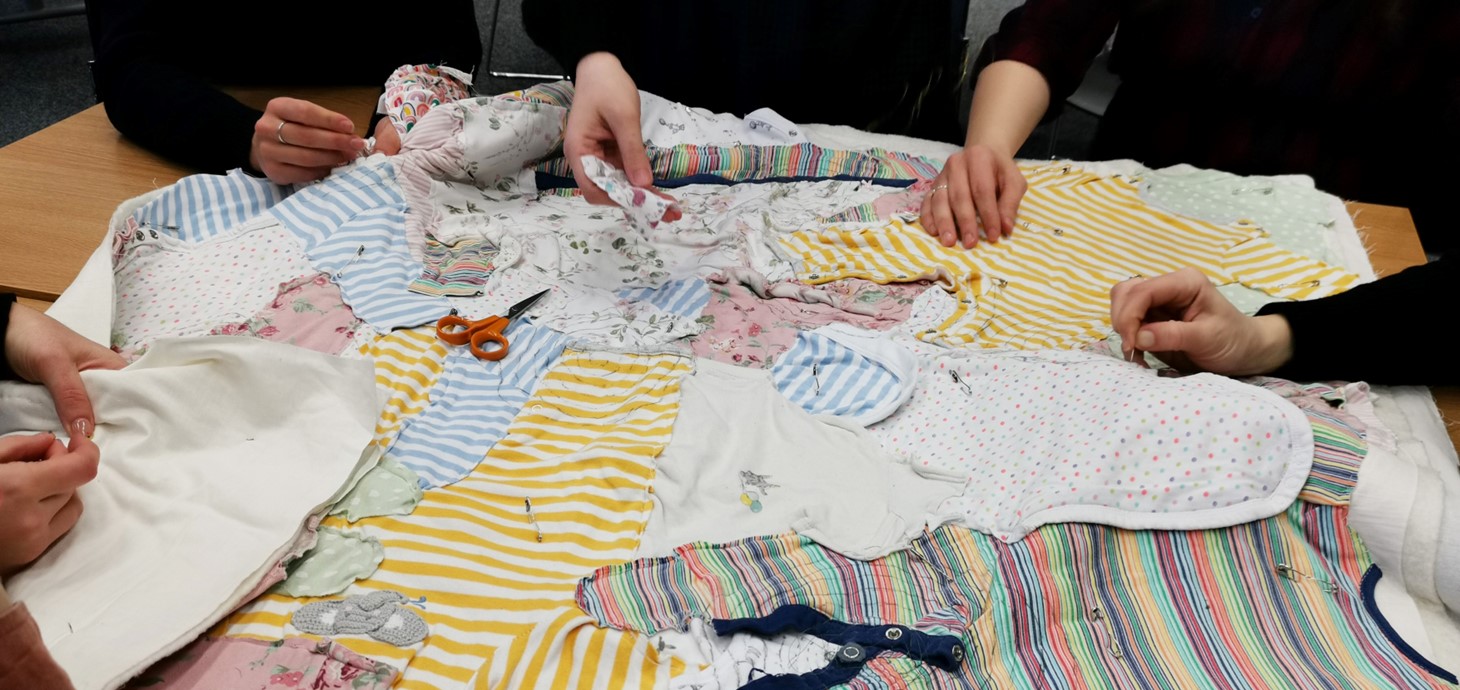
Mothers working on the quilts at the community workshops hosted by the researchers.
A unique project led by Swansea University is recording and sharing new mothers’ complicated feelings around feeding their babies.
The varied experiences of mums involved have now been preserved and form an integral part of the Maternal Guilt Quilt project led by Dr Sophia Komninou, lecturer in public health nutrition in the School of Health and Social Care.
The project saw 12 mothers of young babies from all over Wales describe their emotions around feeding. These were then sent to the research team, along with a piece of their baby’s clothing which were stitched together to create a special interactive quilt.
By pressing digital sensors scattered across the quilt listeners can hear participants’ frank recollections in short audio clips. These range from their delight at the bonding experience to others who admitted having more challenging experiences.
One mother found breastfeeding gave her a way of soothing her baby: “Being able to do that is lovely. It's being able to just go ‘it’s okay, I’m here. You’re safe now, you're all right. Mommy’s got you’.”
However, the mother of a premature baby revealed that for her breastfeeding had been a painful experience: “I always felt guilty about that. I didn't want to leave my baby starving, or to disappoint others, their expectations of me. I will never forget that pain.”
In another of the clips is a woman who admits she felt tremendous guilt after having to stop breastfeeding for health reasons said: “I felt like I had failed at the first thing that I could do for my daughter as a mother. Even now with her being four months old, I still feel incredibly guilty that I couldn't do it.”
Dr Komninou said these feelings are not at all unusual: “Regardless of how mother feed their babies, our previous research shows that they all harbour feelings of guilt. Either that they had not done enough for their child, that they were not enjoying breastfeeding it as much as felt they “should”, or that breastfeeding was taking them away from their partners or other children.”
“This project allowed mothers to speak more openly about their feelings.”
The quilt project sees Dr Komninou collaborating with Dr Angelika Strohmayer, assistant professor in the School of Design at Northumbria University as well as Dr Gillian McFadyen, international politics lecturer at Aberystwyth University.
Dr McFadyen, who researches the use of political embroidery as a method of resistance, memory, activism and storytelling, added: “This project is unique because it departs from dominant breastfeeding literature that tends to focus on positive emotions related to bonding, and offers space for amplifying mothers’ voices and their range of experiences surrounding feeding.”
The project has also drawn on the Welsh communal quilting tradition by hosting community workshops in Aberystwyth and Swansea which gave local mothers the opportunity to talk about motherhood and infant feeding experiences while stitching the quilt.
Dr Strohmayer’s interests in crafting practice and digitally augmented craft are to the fore in the project. She said: “Within the quilt, we are incorporating a number of quilted spirals, a motif very common in Welsh quilting tradition, which are also a metaphor for the spiralling emotions experienced by mothers.”
The project was funded by the Welsh Crucible, the award-winning programme of personal, professional and leadership development for the future research leaders of Wales and where Dr Komninou and Dr McFadyen first met.
Mothers who took part in the quilting workshops consistently pointes out the problems resulting from pressure on maternity services and NHS understaffing. This echoes the recent BBC TV Panorama episode which examined the pressures experienced by midwives and the staffing crisis facing some maternity services.
Dr Komninou said the next stage of the project will see the team applying for funding to allow them to focus on improving the communication and sharing ideas between health professionals and maternal and feeding care provision in Wales.
She added: “We’d like the quilt to become a conversation starter in different settings and be something not only for other mothers but also fathers and healthcare professionals.”
